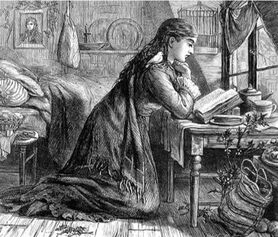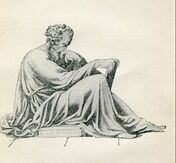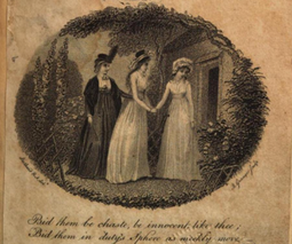| Since I've begun my look at Jane Austen, I've become very interested in studying the now-obscure novels of her time. I think they shed a light on Austen's work. Click here for the first in the series. Click on "Authoresses" on the right for more about other authors in Austen's time. My "Six simple questions for academics" post is here. |
 Suffering in a garret
Suffering in a garret Now I’m going to talk about another type of heroine--a more extreme version of the "picture of perfection" heroine--the “bear and forbear” heroine. This type of heroine suffers intensely through no fault of their own, and puts up with a great deal of mistreatment. She is explicitly held up to the reader, particularly the female reader, as someone to admire and emulate.
A prime example of this type of heroine is Fanny Belton, the heroine of The Woman of Letters (1783). I referred to this novel previously in my list of heroines named Fanny. Fanny Belton, the daughter of a poor curate, is orphaned early in the story. She behaves impeccably through her various travails, fleeing would-be seducers, and bearing with the unkindness of her aunt and cousins. Tossed out of the house by her aunt, she supports herself by her pen while nearly starving in a garret and fends off more would-be seducers. She doesn’t get to marry the man she loves because he was forced to marry someone else. When she comes home from church after marrying a man she doesn’t love, she gets a letter from the man she does love, announcing that he is now a widower and wishes to marry her. So she misses her happy ending by one day. Fanny stays loyal to her worthless husband who only married her for her meagre savings. He takes all her money and spends it on drink and loose women. She and her child end up dying in debtor’s prison...
 Epictetus (50 – c. 135 AD)
Epictetus (50 – c. 135 AD) The adage “bear and forbear" appears to originate with Epictetus. A book about classical proverbs explains: “Bear and forbear, a phrase frequently used by Epictetus, as embracing almost the whole that philosophy or human reason can teach us—Of this Epictetus as a memorable example, no man bearing the evils of life with more constancy or less coveting its enjoyments.” This explanation is by Robert Bland in his book, Proverbs, Chiefly Taken from the Adagia of Erasmus, with Explanations and Further Illustrated by Corresponding Examples from the Spanish, Italian, French and English Languages.
We cannot understand how any age could have been interested in Patient Griselda. -- Lionel Trilling
 Patient Griselda, Frank Cadogan Cowper
Patient Griselda, Frank Cadogan Cowper I have no idea how readers of the day responded to the story of Patient Griselda, but to modern minds it is bizarre. How can being reunited with someone who has subjected you to horrible psychological abuse and deception be regarded as a “happy ending”?
Scholar Lois Bueler calls Patient Griselda an archetype of the "tested woman plot" and she finds many examples in literature.
Another example of a heroine who is tested and harbors no resentment is Hero in Much Ado About Nothing. Falsely accused of being unchaste --by her groom! --at the altar! She goes away (and presumably cries) until her good name is restored and she marries the man who defamed her.
Maria Edgeworth spoke approvingly of the heroine who bears her wrongs with quiet resignation in her novel Leonora, and we have a bit of a reminder of the difference between Elinor and Marianne in Sense & Sensibility: “The sacrifice of the strongest feelings of the human heart to a sense of duty is to be called mean, or absurd; but the shameless phrensy of passion, exposing itself to public gaze, is to be an object of admiration. These heroines talk of strength of mind; but they forget that strength of mind is to be shown in resisting their passions, not in yielding to them. Without being absolutely of an opinion, which I have heard maintained, that all virtue is sacrifice, I am convinced that the essential characteristic of virtue is to bear and forbear. These sentimentalists can do neither. They talk of sacrifices and generosity; but they are the veriest egotists—the most selfish creatures alive.”
Edgeworth also wrote a satirical novella, A Modern Griselda, about a neurotic, manipulative woman who destroys her marriage. A culturally literate person in Austen's time knew the tale of Patient Griselda.
In Lady Jane’s Pocket, (1815) we meet the minor character of Miss Bromley, the only daughter of a widow who has grown deaf, senile, and peevish.
“Nothing can be more pitiable than her situation;” explains her friend Mrs. Sinclair, “doomed to be shut up with that poor superannuated woman all day, and in the evening obliged to make up a card party with a set that hardly know clubs from spades.”
But worse, Miss Bromley can’t leave her mother to emigrate to Canada to be with Major Knightley, the man she loves. “I do not know any one who has more merit. To bear and forbear has ever been her fate, and her filial piety has hardly any example.”

However, not all other heroines who “bear and forbear” do not get a happy ending, including the heroine Agatha herself. Agatha agrees to take her vows and become a nun in France in the name of filial obedience, because her mother made a vow that Agatha would do so. In France, Agatha is caught up in the French Revolution, which persecuted priests and nuns. If she had ignored her mother’s injunction and married the man she loved, she and everyone she knew would have been happy, including her parents. Instead, they end up being guillotined by the revolutionaries. Agatha, “blest with a spotless and self-approving heart… leads a life of peaceful resignation,” far from the troubled world, “in the firm hope and assurance of Eternal Happiness hereafter.”
You might be interested to know that here, at least, the reviewer for The Analytical Review felt he had to draw the line on this whole “sacrifice” thing, especially when the sacrifice involves Catholicism, for Pete’s sake:
| The conduct of Agatha, however glossed over with the specious names of heroism and filial piety, is in reality both weak and criminal: the sacrifices which she makes are not to reason and utility, but to prejudice and fanaticism…. to make rash vows is folly, to keep them vice; to promise for another person, or to suppose that other person under an obligation to perform such a promise, under which this story turns, though made by a parent, is still wilder and more absurd. Works of fiction, in order to render virtue lovely and imitable, should place it upon a just foundation… To draw characters, in which every thing human is hunted out of the composition, as in the heroine of the present work, is not to propose models for imitation. |
First, other examples of “bear and forbear” wives and heroines in literature, and some information which might surprise you about the publisher of one of these stories.
| Previous post: Fanny, the forgiving heroine Next post: Bear and Forebear, part two At the end of A Marriage of Attachment, the second book in my Mansfield Trilogy, Fanny stops bearing and forbearing and has a confrontation of sorts with her Aunt Norris. Go here for more about my books. Robert Bland’s guide to proverbial sayings of the classical authors was published in the same year as Mansfield Park and by the same publisher, Egerton. I’m not saying that there is a connection between these two books, it’s just that no Austenite who had noticed this fact could omit to mention it. An entertaining modern review and analysis of Agatha, or, A Narrative Of Recent Events is to be found at the “Course of Steady Reading” blog. Bueler, Lois E.. The Tested Woman Plot: Women's Choices, Men's Judgments, and the Shaping of Stories. United Kingdom, Ohio State University Press, 2001. |

 RSS Feed
RSS Feed